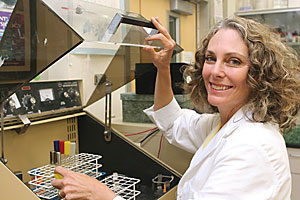 |
|
Josh Fields/Arizona Daily Wildcat
|
Regents professor and BIO5 Director Vicki Chandler prepares and grows cells for research. Chandler was recently awarded almost $4 million for gene research that could lead toward advancements in treatment and detection of harmful diseases like diabetes and muscular dystrophy.
|
|
|
By Ariel Serafin
Arizona Daily Wildcat
Wednesday, October 5, 2005
Print this
The director of the UA's the BIO5 Institute received the Director's Pioneer Award from the National Institutes of Health, which will provide her with about $4 million to fund her research.
UA regents professor Vicki Chandler is the first researcher in Arizona to receive the award, which is given to exemplary, creative scientists. Chandler is one of 13 winners out of about 840 applicants, according to a press release.
The recipients are chosen on the basis of their past history and future promise, Chandler said.
Grace Brown, director of marketing and communication for the BIO5 Institute, said Chandler's research is innovative because it defies many typical assumptions about genetics.
"The (genetic) process is much more complicated than what we think," Brown said.
Research assistant Karen McGinnis, who is working with Chandler, said most of their work involves corn. A typical day of research could involve going out into a corn field, collecting tissue, bringing specimens into the lab or looking at DNA sequences within the plants.
Chandler, who has spent her nine-year tenure at the UA studying plants as model systems for human genetics, said the grant finally allows her to buy equipment worth about $50,000 to study mammalian cells.
"I would not be able to do that without the grant," Chandler said. "(Research) takes time, personnel and resources, and all that adds up to money."
Chandler's research has the potential to discover the genetic causes of some diseases like diabetes and muscular dystrophy, Brown said.
"I think the main thing is if she's able to prove her hypothesis correct we could figure out what is causing some diseases that have been troubling scientists since the beginning of time," Brown said.
McGinnis agreed the research has potentially groundbreaking implications for human genetics and health research.
"I think the first step to curing anything really is understanding," McGinnis said. "Vicki has the skills and the resources to really branch out and look in other types of organisms."
Receiving the award was a testament to the potential benefits of her research, Chandler said.
"In a sense (the award) is given based on past record and promise," Chandler said. "It's a very exciting, freeing experience. "
